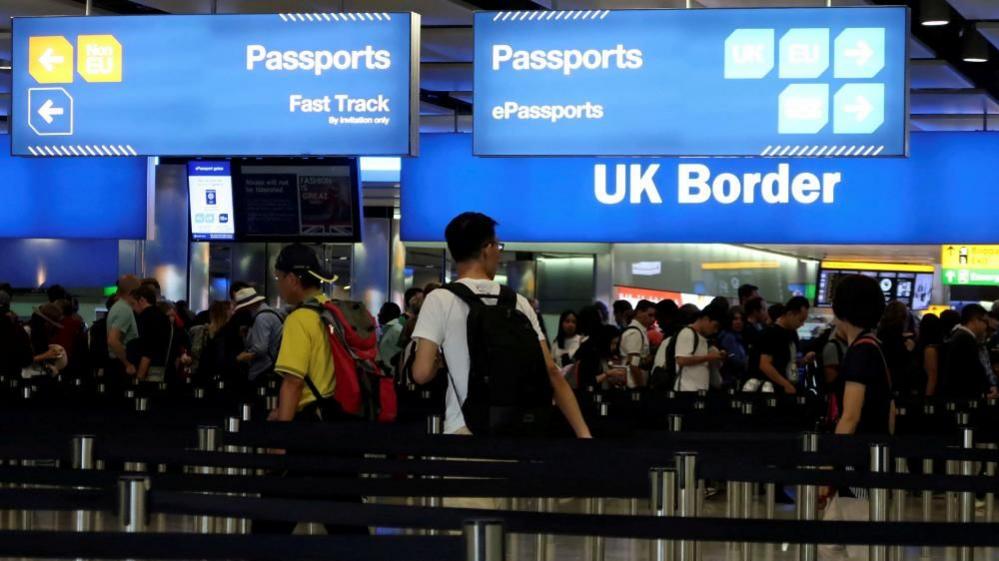Migrants will need A-level standard English to work in UK

- Published
Some migrants coming to the UK will need to speak English to an A-level standard under tougher new rules set to be introduced by the government.
The changes, which will come into force from 8 January 2026, will affect some graduates and those applying for skilled worker or scale-up visas, which are for people employed by fast-growing businesses.
The new rules form part of wider plans to cut levels of immigration to the UK outlined in a white paper in May.
Home Secretary Shabana Mahmood said: "If you come to this country, you must learn our language and play your part."
"This country has always welcomed those who come to this country and contribute," Mahmood said.
"But it is unacceptable for migrants to come here without learning our language, unable to contribute to our national life."
Applicants will be tested in person on their speaking, listening, reading and writing at Home Office-approved providers, with their results checked as part of the visa process.
Those applying for skilled worker, scale-up and high potential individual (HPI) visas will be required to reach B2 level - a step up from the current B1 standard which is equivalent to GCSE.
To come to the UK on the skilled worker visa, migrants have to work for a government-approved employer and earn at least £41,700 a year, or the "going rate" for their type of work, whichever is highest.
The scale-up visa is open to migrants coming to work for a fast-growing UK business. Migrants can apply for a high potential individual visa if they have been awarded a qualification from a top global university within the last five years.
According to the British Council, which offers English language courses, learners who achieve B2 level can "understand the main ideas of complex texts on concrete or abstract topics."
They can express themselves "fluently and spontaneously" and communicate comfortably with other English speakers. They can also produce "clear, detailed text on many subjects and explain a complex viewpoint".
Further English language requirements for other visa routes and family dependants are expected to be introduced in due course, Home Office Minister Mike Tapp told Parliament on Tuesday.
The prime minister previously said the changes outlined in the white paper would make the UK's immigration system "controlled, selective and fair".
Home Office estimates suggest the measures could reduce the number of people coming to the UK by up to 100,000 per year.
Net migration to the UK - total permanent arrivals minus total permanent departures - fell to 431,000 in 2024, down almost 50% on the total in 2023, when it reached a record high of 906,000.
Dr Madeleine Sumption, director of the Migration Observatory at the University of Oxford, said the government faced a "trade-off" between "ensuring migrants speak good English and enabling employers to recruit workers who are expected to bring economic benefits."
Many graduate jobs already require language skills above A-level standard, she said.
The new language requirements will have "more impact in middle-skilled jobs involving technical and manual skills, where employers sometimes do not require high language proficiency".
Immigration lawyer Afsana Akhtar told BBC News she thought it was "unfair" that migrants had to reach such a high standard of English "because even many people in the UK probably wouldn't be able to pass English A-level".
"This would rule out even skilled workers who want to come and contribute to our British economy," she said.
"The GCSE standard is sufficient - and then when they come live here, [and] integrate into England and the English way of life, their English will improve inevitably."
Other measures in the white paper include cutting the time period international students can stay in the UK to find a graduate job after their course ends from two years to 18 months, which will take effect from January 2027.
Students will also have to meet higher financial requirements, raised to £1,171 per month outside London (from £1,136) for up to nine months.
The Global Talent visa, for high achievers in technology, arts and academia fields has also been expanded to include winners of more prestigious prizes.
Further plans in the White Paper include, the immigration skills charge for UK employers to pay when sponsoring foreign workers on specific visas has also been increased to £480 per person per year for small organisations or charities, and to £1,320 for medium and large organisations.
This is raised from £364 and £1,000 respectively.
As part of the government's efforts to attract highly skilled people to the country, the HPI route will be expanded. The number of migrants on the visa is expected to double from 2,000 to 4,000, but there will be a cap of 8,000 applications each year.